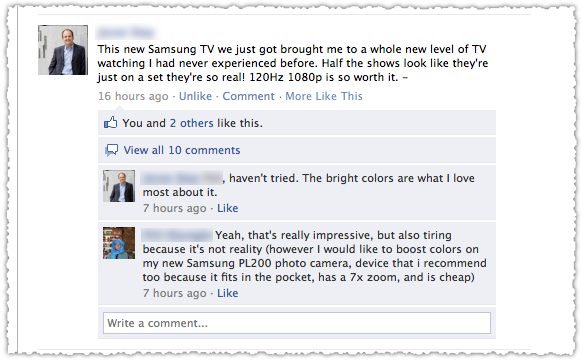Facebook continues to test and improve their own search results. Yet, are we too focused on how Facebook is tackling traditional search?
Lately I’ve been thinking about another way Facebook could implement search, transforming the news feed into a search result.
More Like This
What if Facebook added a simple More Like This link to certain news feed items?

Clicking on the More Like This link would return a news feed with related content. In this instance, it would return Open Graph pages related to Samsung and HDTVs.
A filtered news feed becomes the search result.
The news feed would be a mix of related pages Liked by those in your own social graph, popular pages from the Open Graph in general and, potentially, sponsored stories.
I think the More Like This verbiage conveys relevancy and also capitalizes on the Like terminology. And presenting the results in a news feed hopefully reduces friction and eases people from one mental context to another.
I’d probably use a compact display that presented the number of Likes and Comments for each item. Perhaps comments are exposed just for those in your own social graph with the remaining comments available on demand?
Really, the design element are all things Facebook could quickly test and iterate on. Getting a More Like This feature to work is the difficult part.
Content Analysis
Implementing a More Like This feature relies on a number of assumptions. The largest of these assumptions is whether Facebook can identify the content of a news feed item. My example might be difficult because it’s a simple status update without a link that has Open Graph data already attached to it.
Yet, Facebook has developed content filtering for pages, updating their capability recently to auto detect potential spam posts and now provides keyword level blacklists.
More importantly, Facebook has tested semantically related content. While none of these point to true natural language processing, there seems to be a fair amount of effort on bridging the divide between text and Open Graph objects.
Moving Intent
Why is this interesting? I believe a More Like This feature would change or move user intent. Search has traditionally been about intent harvesting. Users come to Google with an intent. (“I want to find a creme brulee recipe.”) At that point it’s a bit like shooting fish-in-a-barrel.

Why did I want to find that creme brulee recipe? What created that intent?
Did I see one on Tastespotting? Did someone start a favorite dessert thread on Facebook? My wife ordered one last night? Or maybe I saw a check-in at Whole Foods which gets me thinking about their creme brulee? Any of these things, or a combination of them, could have been responsible for intent generation.
AdSense is largely looking to bridge the divide between intent generation and intent harvesting. It hopes to match ads to content. While it’s gotten better, the Google Search Network performs far better than the Google Display Network. Similarly, Facebook Ads tries to bridge the same divide through interest targeting.
It’s the difference active and passive, between explicit and implicit.
Assisted Search
A More Like This feature creates an interaction – an activity. The user is raising their hand and requesting more information about that content or topic. It might not be a traditional search – it may not translate into intent harvesting – but it’s certainly much further down the spectrum.
Lets be clear, this isn’t nearly as explicit as someone typing in a search query. I’d think of More Like This clicks as assisted searches. They signal some greater level of interest and engagement. How much is difficult to tell, though you could learn a lot through the Like and click-stream behavior from these More Like This results.

Clicking More Like This in this instance would return a collection of pages about football, specifically about Liverpool football. It could also contain an item for Liverpool FC jerseys or a link to a game plan ticket package. Facebook could learn, just as Google does, what mix of results provides the best experience.
Of course, a lot of this depends on semantics.
Semantic Enhancement
Semantics could make the More Like This feature quite powerful. If Facebook can identify the topic (or object), semantics could help surface a host of related content and expand the advertising targets for each assisted search.
Lets take my creme brulee example. Semantics would help you find recipes but also restaurants with the best creme brulee, as well as retailers who carry a creme brulee torch.
This is all predicated on an object based search system rather than a keyword based in system. This is important when thinking about monetization. A keyword based system delivers specificity. An advertiser can bid on the term ‘buy creme brulee torch’ and be confident they’re matching the query intent.
An object based system may not deliver that level of detail. But it seems the likely first step if Facebook were going to implement a More Like This feature, allowing advertisers to bid against More Like This results by object.
Facebook SEO would also become critical if something akin to More Like This were implemented and became popular.
Search Assumptions
Facebook already has the social component that traditional search engines like Bing and Google are furiously trying to integrate into their own search results. So while I and many others are focused on the amount of volume and revenue produced through the Facebook search bar, the number of total searches could soar through a different entry point into search.
Are we laboring under the false assumption that Facebook must implement search the same way as Google?
The Next Post: Google Doesn’t Trust Us
The Previous Post: The Link Graph Is Broken

4 trackbacks/pingbacks
Comments About The Future of Facebook Search?
// 1 comments so far.
H // February 23rd 2011
This is such an awesome post. I was thinking about this yesterday, especially the intent issue – and a More Like This button would certainly help flag up a user’s interest.
Sorry to kind of reiterate what you’ve already said – but a really thought-provoking post.
Sorry, comments for this entry are closed at this time.
You can follow any responses to this entry via its RSS comments feed.